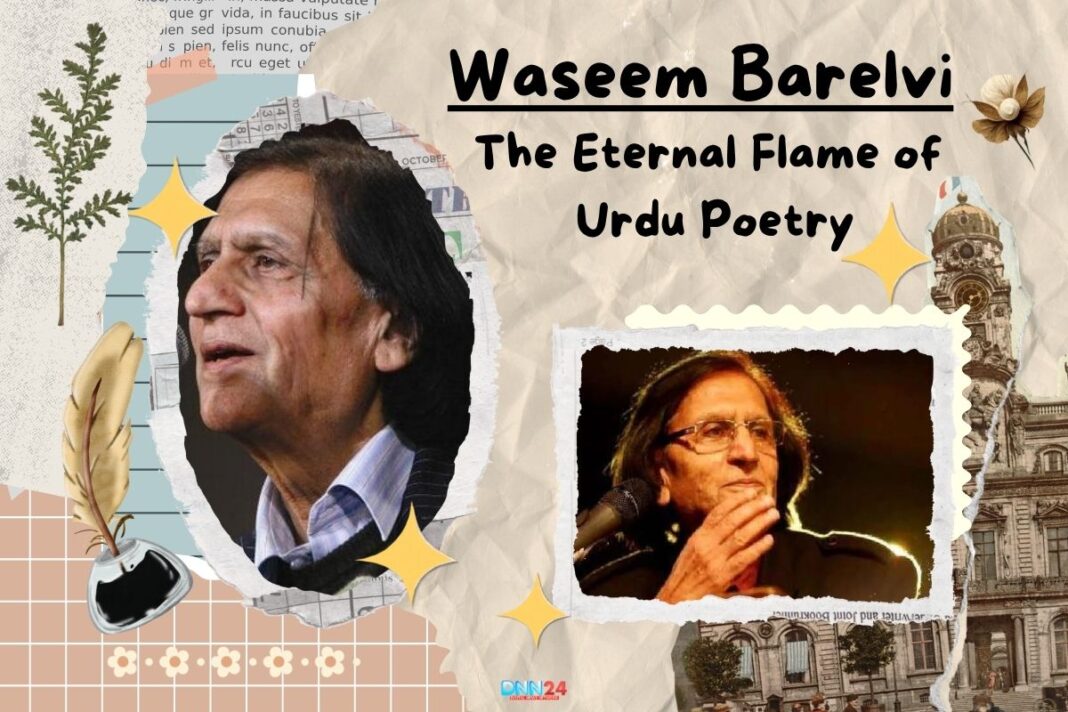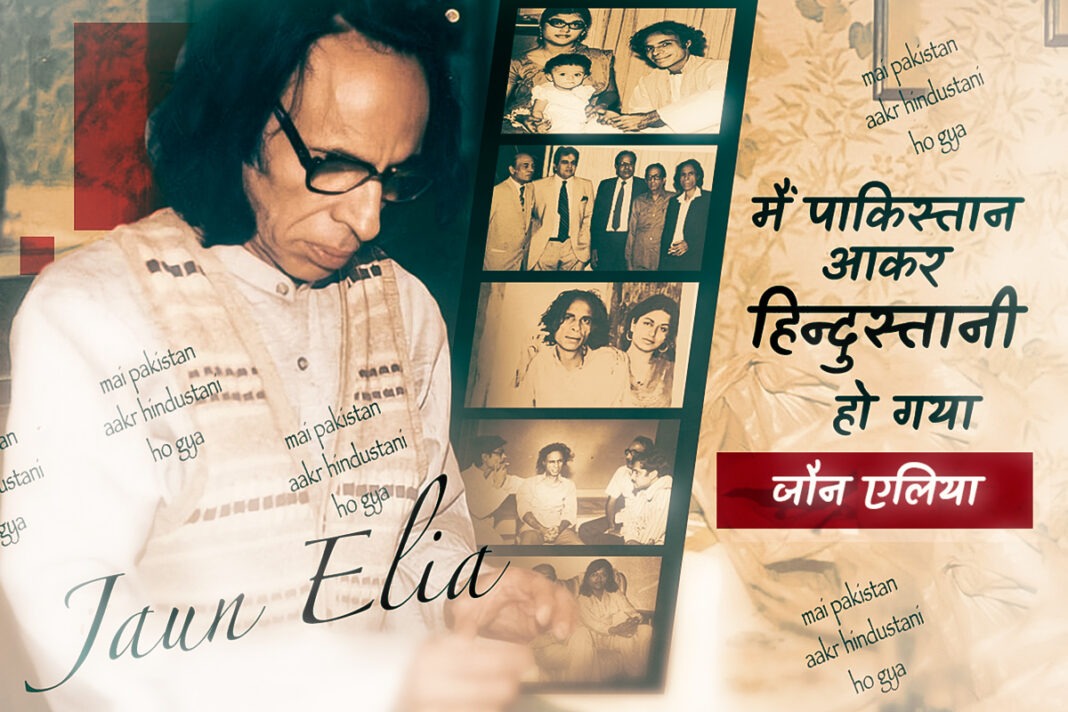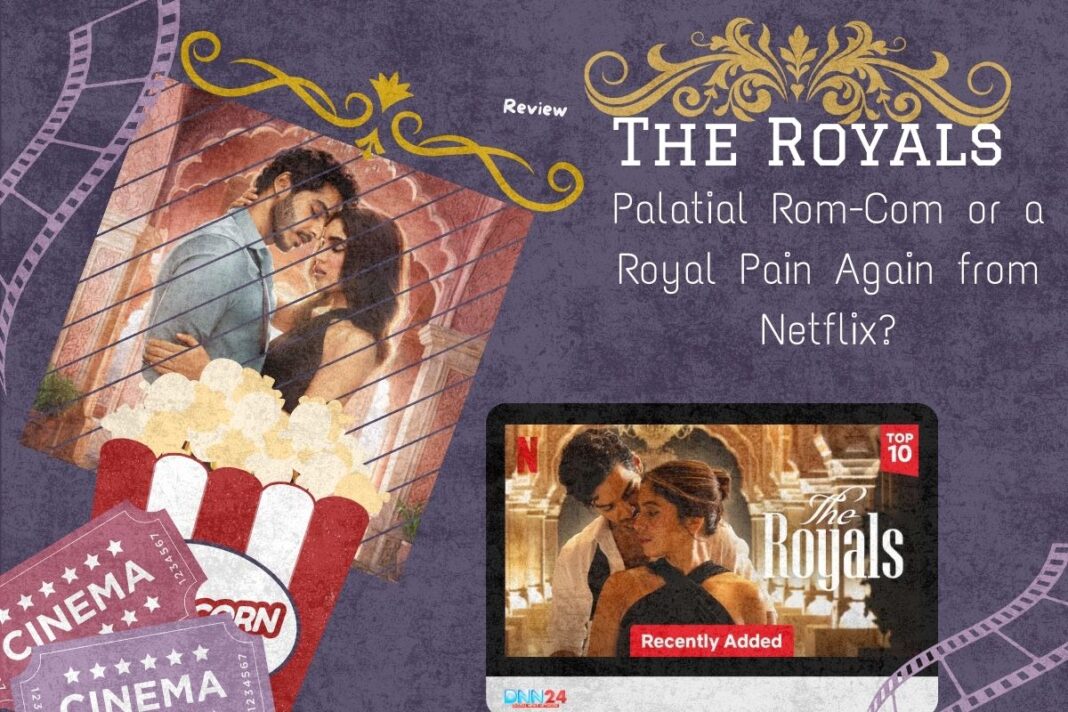Whenever Urdu poetry is mentioned, the name of Waseem Barelvi shines like a lamp in the darkness. His couplets are not simply a form of poetry but an ointment to the wounded hearts, the tongue of love. Born as Zahid Hussain on 18th February 1940 in Bareilly, Uttar Pradesh, Waseem Barelvi’s journey from the narrow streets of Bareilly to the grand stages of international mushairas is a story woven with emotions, dreams, and the fragrance of Urdu. Millions have been affected with his words, and his shayari reflected in every mehfil, every meeting of hearts that long for comfort.
“Tujhe paane ki koshish mein kuchh itna kho chuka hoon main,
Waseem Barelvi
Ki tu mil bhi agar jaaye to ab milne ka gham hoga.”
This couplet reflects the depth of his poetry-love, loss, and the bittersweet pain of longing. Waseem Barelvi is not just a poet; he is the heartbeat of every lover, the companion of every lonely soul. His shayari has been sung by legends like Jagjit Singh, making his words immortal in the world of music and poetry. He has received many awards, including the Firaq Gorakhpuri International Award and the Kalidas Gold Medal, but his biggest reward is the love of his admirers. In every corner of India and beyond, his poetry is a bridge that connects hearts and brings people closer.
The Early Days: A Poet is Born
Waseem Barelvi’s childhood was filled with the aroma of books and the melody of Urdu. Growing up in Bareilly, he was surrounded by the beauty of language and the warmth of family. His father, a lover of literature, would often narrate stories and recite poetry, planting the seeds of creativity in young Zahid’s heart. Even as a child, he would scribble lines on scraps of paper, trying to capture the magic of words.
One day, while sitting under a neem tree, he wrote his first couplet. The lines were simple, but the feeling was pure. His friends laughed, but his mother’s eyes sparkled with pride. She knew her son was destined for greatness. Waseem often recalls this moment in his shayari:
“Bachpan ki galiyon mein ab bhi ghoom aata hoon,
Waseem Barelvi
Wahan ki mitti se ab bhi khushboo aati hai.”
His journey was not easy. He faced struggles, rejection, and loneliness. But he never gave up. He completed his M.A. in Urdu literature from Agra University in 1958 and started his career as a lecturer. His passion for poetry grew stronger with every passing day, and soon, he became a regular at mushairas, where his soulful voice began to echo in the hearts of listeners.
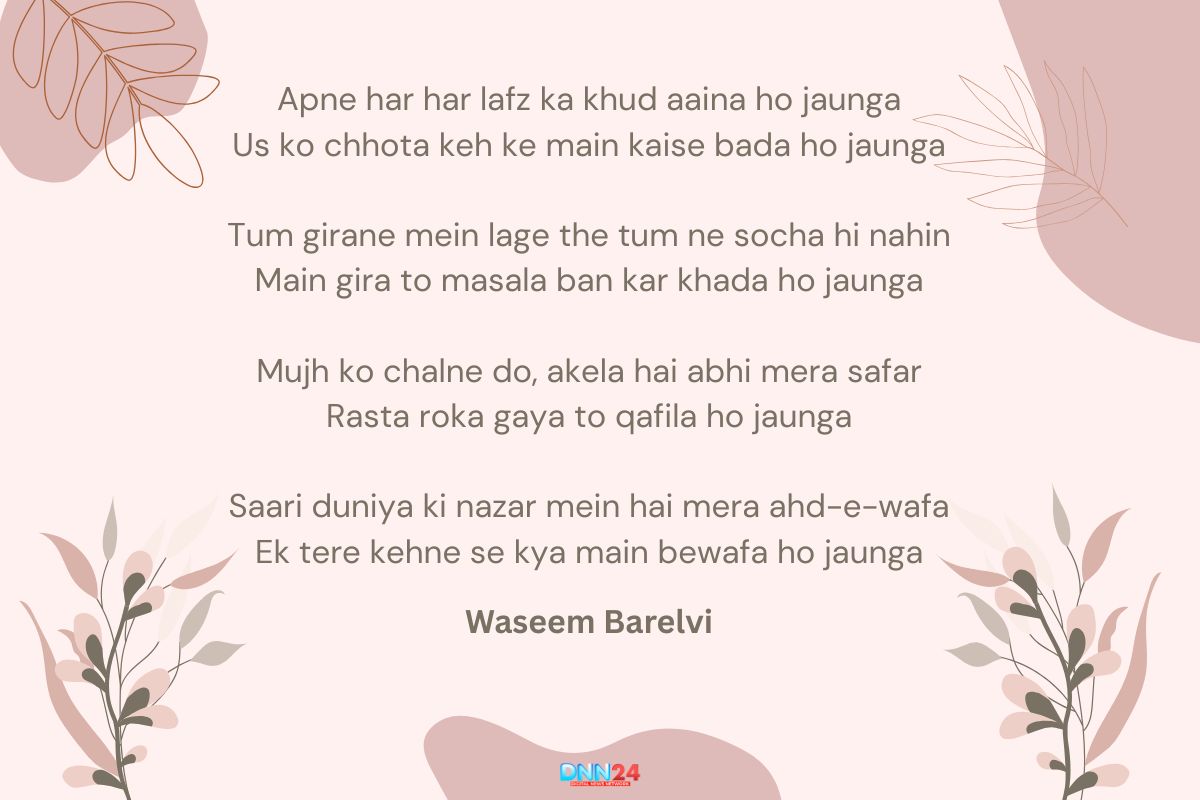
The Magic of Mushairas: Barelvi’s Rise to Fame
The world of mushairas is a world of magic, where words dance and emotions flow like rivers. Waseem Barelvi’s entry into this world was like the arrival of spring after a long winter. His first big break came at a local mushaira in Bareilly, where he recited a ghazal that left the audience spellbound. The applause was thunderous, and from that day, there was no looking back.
“Jahan rahega wahin raushni lutaega,
Waseem Barelvi
Kisi charagh ka apna makan nahi hota.”
This sher became his identity, a symbol of hope and selflessness. Barelvi’s mushaira performances are legendary. His voice, his expressions, and his ability to weave emotions into words make every gathering unforgettable. People travel miles just to hear him recite. He believes that poetry is not just about words; it is about feelings, about touching souls and healing wounds. His shayari is a reflection of life itself-sometimes sweet, sometimes bitter, but always true.
Shayari: The Language of Love and Pain
Waseem Barelvi’s shayari is like a gentle breeze that soothes the heart and stirs the soul. He writes about love, pain, separation, and hope in a style that is simple yet profound. His words are easy to understand, but their impact is deep and lasting. Every couplet is a story, every sher is a world in itself.
“Meri wafaon ka nasha utarne wala,
Waseem Barelvi
Lahu na ho to qalam tarjuman nahi hota.”
His poetry is filled with emotions that everyone can relate to. Whether it is the joy of meeting a loved one or the sorrow of parting, his shayari captures every shade of human experience. He believes that poetry should be accessible to all, not just scholars and intellectuals. That is why his language is simple, his imagery is clear, and his message is universal. In every line, there is a lesson, a truth, a glimpse of life’s beauty and pain.
Life’s Unheard Stories: Kissey from Barelvi’s Diary
Behind every famous poet, there are stories that remain hidden from the world. Waseem Barelvi’s life is full of such unheard kissey, tales that reveal the man behind the poet. One such story is about his first mushaira outside Bareilly. He was nervous, his hands trembled, and his heart raced. But as he began to recite, he saw an old man in the audience wiping his tears. After the event, the man hugged him and said, “Beta, tumne mere dil ki baat keh di.” That night, Barelvi realized the true power of poetry.
“Dukh apna agar hum ko batana nahi aata,
Waseem Barelvi
Tumhe ghamon ka samjhna agar na aayega.”
Another story is about his days as a teacher. He would often use shayari to explain difficult lessons. His students loved him, not just for his knowledge but for his kindness. Once, a student who was struggling with family problems came to him for help. Barelvi wrote a couplet for him:
“Andheron se ladne ka hausla rakh,
Waseem Barelvi
Har raat ke baad savera hota hai.”
These stories show that Waseem Barelvi is not just a poet but a compassionate human being whose life is as beautiful as his poetry.
Nazm: The Heartbeat of Barelvi’s Poetry
If ghazal is the soul of Urdu poetry, nazm is its heartbeat. Waseem Barelvi’s nazms are celebrated for their emotional depth and romantic charm. He writes about love in a way that makes the reader feel every heartbeat, every sigh, every unspoken word. His nazms are not just poems; they are confessions of the heart, letters to a beloved, songs of longing and hope.
“Aankhon aankhon rahe,
Waseem Barelvi
Baaton baaton mein dil ki baat keh di.”
In his nazms, love is not just a feeling but a journey-a journey of two souls who meet, part, and meet again in the world of dreams. He writes about the pain of separation, the joy of reunion, and the sweetness of memories. His language is simple, but his emotions are intense. He believes that true love is eternal, and his nazms celebrate this eternal bond.
“Usne meri raah na dekhi aur woh rishta tod liya,
Waseem Barelvi
Aate aate mera naam sa reh gaya.”
His nazms are often recited at weddings, anniversaries, and romantic gatherings. They are a source of inspiration for lovers and a comfort for those who have lost love. Through his nazms, Barelvi teaches us that love is not about possession but about understanding, sacrifice, and trust.
Awards, Recognition, and the Journey Ahead
Waseem Barelvi’s contribution to Urdu poetry has been recognized with numerous awards and honors. He has received the Sahitya Akademi Award, the Ghalib Award, the Firaq Gorakhpuri Award, and many more. But for him, the real award is the love and respect of his fans. He has served as the Vice Chairman of the National Council for Promotion of Urdu Language (NCPUL) and has been a member of the Legislative Council of Uttar Pradesh since 2016.
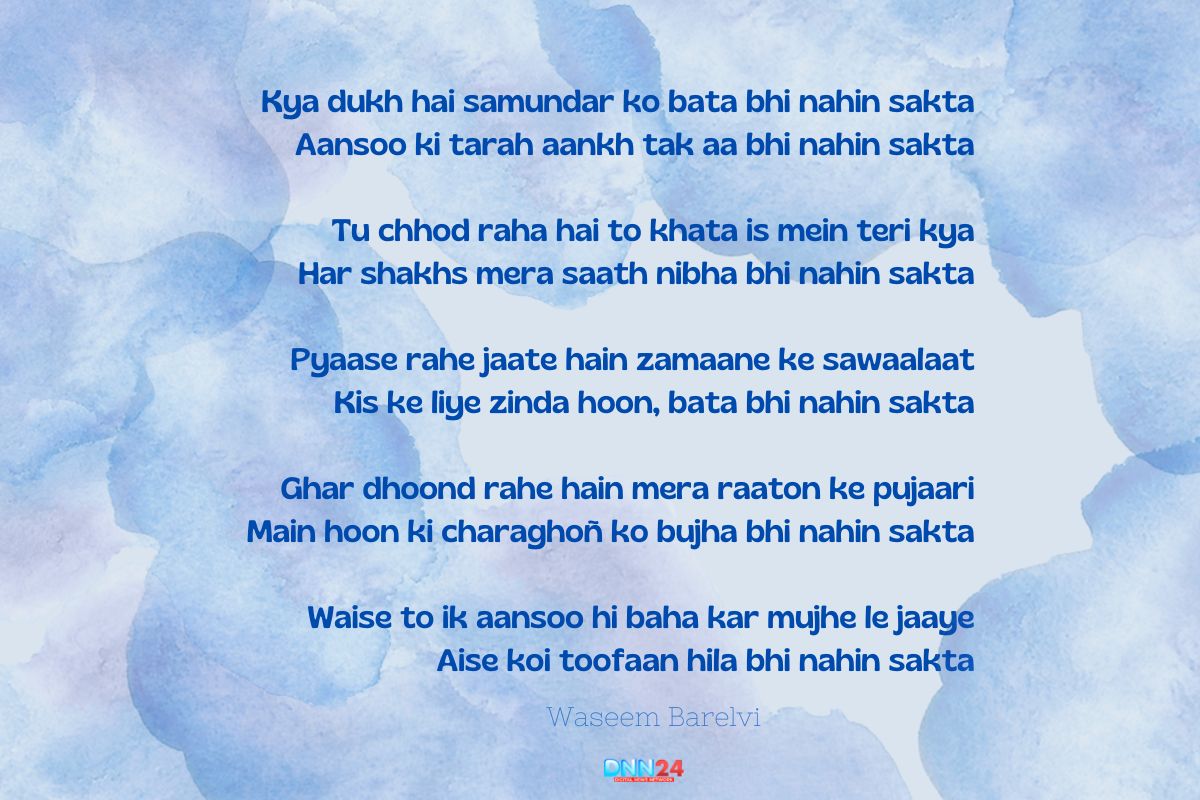
Despite his fame, Barelvi remains humble and grounded. He continues to write, recite, and inspire. He believes that poetry is a lifelong journey, and every day is a new beginning. His message to young poets is simple: write from the heart, stay true to yourself, and never stop dreaming.
“Apne har har lafz ka khud aaina ho jaoonga,
Waseem Barelvi
Apne andaaz ka akela tha.”
His journey is far from over. As long as there are hearts that feel and souls that seek, Waseem Barelvi’s poetry will continue to light up the world.
The Legacy of Waseem Barelvi: A Bridge of Emotions
Waseem Barelvi’s legacy is not just in his books or awards but in the countless lives he has touched. His poetry is a bridge that connects people across cultures, languages, and generations. He has made Urdu poetry accessible to all, breaking barriers and spreading love. His words are recited in India, Pakistan, and wherever Urdu is loved.
He is a poet for all seasons, all reasons. Whether you are happy or sad, in love or heartbroken, you will find a companion in his shayari. His poetry is like a river-sometimes calm, sometimes turbulent, but always flowing, always alive.
“Sabhi ka dhoop se bachne ko sar nahi hota,
Waseem Barelvi
Dukh apna agar hum ko batana nahi aata.”
Waseem Barelvi’s life and work are a celebration of the human spirit. He teaches us to love, to hope, to dream, and to never give up. His poetry is a reminder that even in the darkest times, there is always light, always hope.
Conclusion: The Eternal Lamp of Urdu Poetry
In the world of Urdu poetry, Waseem Barelvi is like a lamp that never goes out. His words continue to inspire, heal, and unite. He is the soul of every gathering and the voice of every heart. His shayari is a gift to the world, a treasure that will be cherished for generations to come.
“Jahan rahega wahin raushni lutaega,
Waseem Barelvi
Kisi charagh ka apna makan nahi hota.”
Let us celebrate the life and poetry of Waseem Barelvi-a poet, a teacher, a friend, and above all, a lover of humanity. His journey reminds us that poetry is not just about words; it is about feelings, about touching lives, and about spreading love.
Also Read: Ahmad Faraz: The Poet Whose Words Dared the World
You can connect with DNN24 on Facebook, Twitter, and Instagram and subscribe to our YouTube channel.

